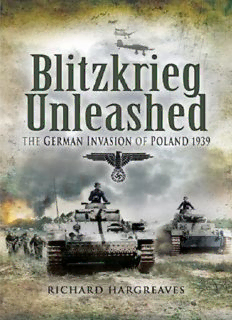
Blitzkrieg unleashed : the German invasion of Poland 1939 PDF
Preview Blitzkrieg unleashed : the German invasion of Poland 1939
First published in Great Britain in 2008 by Pen & Sword Military An imprint of Pen & Sword Books Ltd 47 Church Street Barnsley South Yorkshire S70 2AS Copyright © Richard Hargreaves 9781781598382 The right of Richard Hargreaves to be identified as Author of this work has been asserted by him in accordance with the Copyright, Designs and Patents Act 1988. A CIP catalogue record for this book is available from the British Library All rights reserved. No part of this book may be reproduced or transmitted in any form or by any means, electronic or mechanical including photocopying, recording or by any information storage and retrieval system, without permission from the Publisher in writing. Printed and bound in the UK By Biddles Pen & Sword Books Ltd incorporates the Imprints of Pen & Sword Aviation, Pen & Sword Maritime, Pen & Sword Military, Wharncliffe Local History, Pen & Sword Select, Pen & Sword Military Classics, Leo Cooper, Remember When, Seaforth Publishing and Frontline Publishing For a complete list of Pen & Sword titles please contact PEN & SWORD BOOKS LIMITED 47 Church Street, Barnsley, South Yorkshire, S70 2AS, England E-mail: [email protected] Website: www.pen-and-sword.co.uk Table of Contents Title Page Copyright Page Abbreviations Used in References Acknowledgements Introduction Prologue: The Polish Danger is Greater than Ever CHAPTER ONE - A Certain Foreboding CHAPTER TWO - One Hundred Powder Kegs CHAPTER THREE - Is It War or Peace? CHAPTER FOUR - A Very Beautiful September Day is Beginning CHAPTER FIVE - Pluck the Enemy Capital Like a Ripe Fruit CHAPTER SIX - Much Blood has Flowed CHAPTERSEVEN - The Lord Struck Them Down With Man, Steed and Wagon CHAPTER EIGHT - The Edelweiss Becomes the Scourge of the Enemy CHAPTER NINE - Putting Death to the Test CHAPTER TEN - Shoot Them to the Last Pole CHAPTER ELEVEN - A Boiling Kettle of Fire and Blood CHAPTER TWELVE - A Chain of Tragedies Epilogue: It Is God’s Will For Us To Live Advance in Poland Appendix Maps Bibliography Index And we have seen – and experienced – tragic scenes: German soldiers burning, torching, plundering, without giving it a second thought. Mature men, who are not in the slightest bit aware that what they are doing contravenes laws and conventions and offends the honour of the German soldier. – Oberstleutnant Heinrich von Nordheim, Warsaw, October 12 1939 Regarding the course of the Polish campaign all that needs saying is that it demonstrated the tremendous potency of Germany’s young Wehrmacht on such a scale that the whole world sat up and took notice. – Generaloberst Alfred Jodl, Munich, November 7 1943 It is a characteristic of man that he gladly forgets bad times and recalls those much dearer happy times – every detail of which he can still recall years later. Perhaps it is good for our health that time locks away so many brutal blows of fate sent our way and with the help of subsequent happier times, even allows us to overlook the scars which have been left behind. But there are also periods in our lives which we should never forget – first of all to protect us from the same again and, secondly, so that we may enjoy happier times having survived such misery. – German Major Abbreviations Used in References AOK Armeeoberkommando – staff of an army in the field BA-MA Bundesarchiv-Militär Archiv – Bundesarchiv Military Archive, Freiburg CSDIC Combined Services Detailed Interrogation Centre DBFP Documents on British Foreign Policy DGFP Documents on German Foreign Policy Div Division FRUS Foreign Relations of the United States HGr Heeresgruppe – Army Group IWM Imperial War Museum, London Kdo Kommando – command KTB Kriegstagebuch – war diary NA National Archives, Kew NCA Nazi Conspiracy and Aggression NHB Naval Historical Branch, Portsmouth NO/NOKW Documents prepared for the Nuremberg Trials OKH Oberkommando des Heeres – German Army High Command OKW OKW Oberkommando der Wehrmacht – German Armed Forces High Command Pz Panzer TB Tagebuch – diary VfZ Vierteljahrshefte für Zeitgeschichte Author’s note German ranks throughout, with the exception of Generalfeldmarschall (field marshal), have been left in their original language. An explanation of the comparative ranks can be found in the appendix. Except for places commonly known in English, towns and villages are referred to by both their German and Polish names. Polish Army units are italicised to avoid confusion with German formations.
Description: